Your Guide To Atlanta's Buford Highway
Follow along a culinary journey to meet local legends.
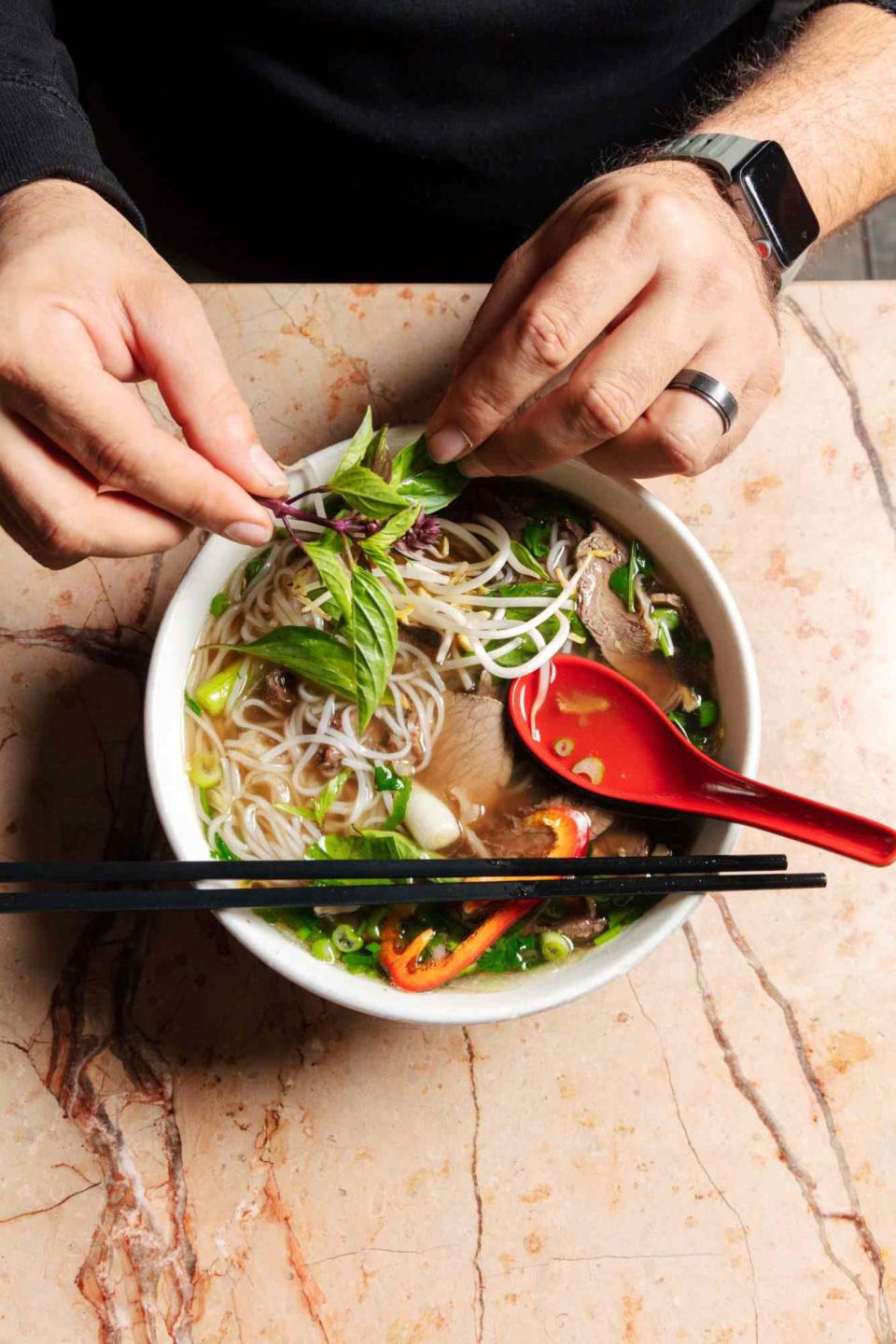
What if someone told you there's a long, sprawling road in Atlanta with some of the most diverse dining experiences in the Southeast, but it isn't named Peachtree or Ponce De Leon?
You'd be forgiven for not expecting this stretch to have the name Buford (especially in Georgia). But it's true—Buford Highway has long been one of Atlanta's greatest experiences. It's a glorious, kaleidoscopic destination where global cultures and ethnic identities can be tasted through delicious cuisines. If this road doesn't sound familiar to you, there's great news: The time is always right for a visit.
Buford Highway is much more than a corridor; it's better described as a community. You'll find nearly 1,000 immigrant-owned businesses, more than 100 of which are restaurants, representing upwards of 20 different nations. They don't simply coexist; they thrive together. There's constant energy provided by the estimated 50,000 residents living along the route (State 13, to be exact) and nearby neighborhoods as well as the flow of in-the-know Atlantans who realize their good fortune and make frequent visits.
Totaling more than 30 miles from Midtown Atlanta to the exurban town of Buford, the highway runs through four suburbs to the northeast: Brookhaven, Chamblee, Doraville, and Norcross. But it is best known for a 10-mile section where many of its highlights are concentrated.
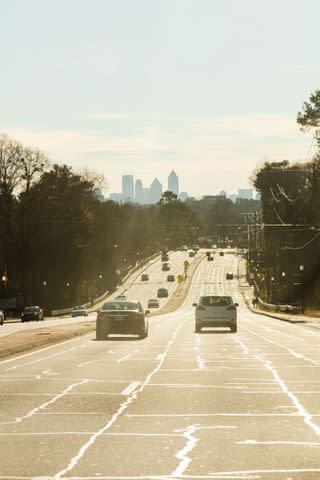
The modern roots of today's Buford Highway are in the automotive industry. In 1945, shortly after the end of World War II, construction began on what would become a General Motors plant in Doraville, at the edge of what is now Atlanta's I-285 bypass, where mostly White blue-collar workers assembled Buick, Oldsmobile, Pontiac, and Chevrolet vehicles. Those who lived in nearby apartment complexes routinely passed strip malls, car dealerships, and fast-food joints along their commutes, until an international array of restaurants began to arrive.
The Sense Of Community
Lily Pabian, executive director of We Love Buford Highway, a nonprofit dedicated to the preservation of this spot's multicultural identity, says that the immigrant communities define the corridor, and (from a market standpoint) it's the services—particularly restaurants—that give it such significance. "The places here mean so much to the local communities," Pabian says. "It's more than just a voyeuristic, 'Oh, let's just try something; let's feel like we're doing something special.' This is not one and done—you take it; you leave it. This is the bread and butter of the area."
Pabian's family heritage connects her to Buford Highway. Her parents grew up in Taiwan and moved the family to the corridor in 1979. Her childhood was full of fond memories, not only of Chinese businesses, community centers, and restaurants, but also of everything else that the long strip offers.
"We want to connect people to resources, but a big piece of advocacy is establishing trust," she says. "We're building relationships because we want people to tell us their stories. It helps them, because their number one priority is to create new lives and survive."
Pabian says visitors should come to Buford Highway with a sense of open-mindedness, in the spirit of the late Anthony Bourdain, who she believes raised awareness about local cultures and customs. "Food bridges that, if you allow it to," she explains.
Why It's A Culinary Destination
Ben Allen is a music producer from nearby Athens and lives in Atlanta with his family. Along with his friend Jonathan Baker, he founded an organization called Buford Highway Adventure Club, which lasted from 2009 until 2013. The idea was to invite hungry Atlantans or visitors to push themselves beyond their comfort zones and into dining experiences that they might not have tried otherwise.
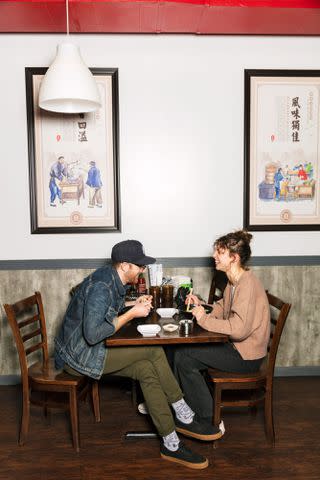
It started very casually, Allen remembers. "We would send one email a week to, like, 30 people and say, 'This is where we're going at 7 p.m. on this night. If anybody wants to carpool, meet at the studio. Otherwise, join us at the restaurant.' Sometimes 5 people would show up, sometimes 25. You never really knew what was going to happen," he says.
Although Allen's schedule no longer allows him time to organize such outings, he discovered places he still frequents today, like Japanese restaurant Shoya Izakaya, which sits just off Buford Highway in Doraville. "It's really, really good. I kept going there and noticing a nearby store called Super H Mart. One day, after eating at Shoya Izakaya, I decided to walk in," he says. "It's this big Korean grocery with hundreds of varieties of rice, pickled vegetables, spices, tons of noodles, and Asian sodas. Now I go there about once a month to buy things like bulgogi and kimchi."
Allen has simple advice for anyone who has ever wanted to find restaurants to support on Buford Highway but doesn't know where to start. "Go out there, and eat. I now have my 10 spots that I love. It's an example of the kind of thing that can happen—you get exposed to all these places and realize, 'Wait a second...This whole world exists, and it's so different from the rest of Atlanta.' To me, it's just so cool," he says.
Whether you're planning a road trip or looking for new places to dine in the Atlanta area, here are the five must-stop spots along Buford Highway.
Havana Sandwich Shop
It's hard to miss Havana Sandwich Shop. The one-story building isn't very big but has an oversize presence, thanks in part to its flashy appearance: Bright green palm trees are painted over the banana-yellow base on its facade. While there's no historical marker to inform first-time visitors of its status, this small but mighty spot was Buford Highway's first immigrant-owned restaurant. And to this day, Havana remains a reliably consistent place to get a Cuban sandwich that's uncompromising in its adherence to family tradition.
Debbie Benedit is the owner of Havana Sandwich Shop. Her late husband, Eddie, came to the U.S. with his Cuban family in the 1960s. Shortly after they were married, she found herself unexpectedly wedded to a family of restaurateurs. Despite several changes over the years (a devastating fire in 2008, openings and closures of second and third locations, and more) this funky little building that started it all in 1976 still stands. "Listen, it's a hole-in-the-wall, but you see the color of it, the yellow and John Deere green. It grabs your attention," Benedit says. "People are drawn to this building—the chaos, the loudness, the laughing, and the wonderful smells. We're at the beginning of Buford Highway. We lead the way, so to speak."
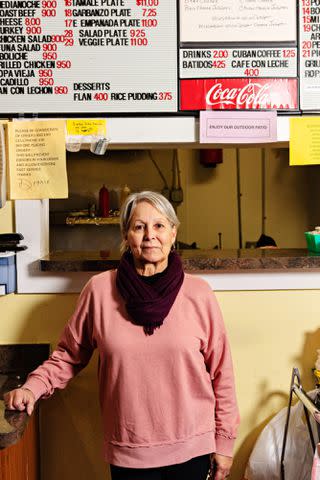
Benedit says Havana was based on her late husband's dream and intuition of what was missing in Atlanta during those days. "The mid-seventies were a very difficult time," she recalls. "We had a new President, and there were a lot of unknowns plus high inflation. It was probably not the best time to open up a restaurant; we had no clue what we were doing."
Still, her mother-in-law had recipes, her father-in-law had a business mind, and her late husband loved to cook. "They just decided we were gonna bring Cuban food to Atlanta. When my husband told me that, I looked at him and asked, 'Who's gonna eat that here?' And then he said, 'You watch.'"
Forty-six years later, Benedit; her son, Eddie Jr.; and the crew of women employees who've been with her for decades still make and sell the same Cuban sandwich. She explains that Havana's basic concept is consistency, quality, and affordability, and she's very particular about the simplicity of the star menu item. It features thinly sliced ham and white American cheese because she says Swiss cheese is too overpowering. "It takes away from the taste of the meat, the pickles, and the yellow mustard," she insists. "But a Cuban sandwich is really all about the bread. It's toasty and crunchy on top yet soft on the inside. If you don't use the right kind, you've got a Subway sandwich."
Havana is where a dream helped inspire a legacy, because one family knew that Atlanta would love a proper Cuban sandwich and that together they could survive the changing times.
havanaatlanta.com; 2905 Buford Highway NE. (at North Druid Hills Road & Buford Highway), Atlanta, GA
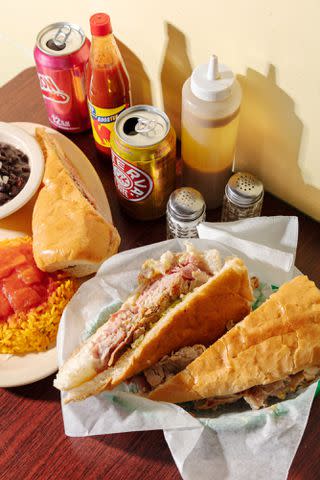
Pho Dai Loi #2
The catty-corner brick building in the Little Saigon Plaza, just off Buford Highway in Chamblee's city limits, looks almost like it's welcoming you into the tall stucco center with open arms. Embedded at the top of the building's entrance is a clock next to a circular green-and-white sign that reads "PHO" in capital letters. In the rectangular space between those exterior decorations and the top of the archway above the restaurant, eight bold, red-lit characters spell out "Dai Loi #2." It may seem like an unassuming building from across the parking lot, but step through the arch and you will arrive at one of the most name-dropped restaurants in all of metro Atlanta.
Pho Dai Loi #2 is the Buford Highway outpost of a popular chain of Vietnamese restaurants launched by Lenh Luong, a Vietnamese immigrant who arrived in Atlanta in 1991. As the "#2" suggests, it is not the original location; it's just the best known. Many Atlanta foodies tend to live north of downtown, making them more likely to visit the Buford Highway site (opened in 2002) than Pho Dai Loi #1, which opened in 1998 on Jonesboro Road in the city of Forest Park just beneath Atlanta's southeast perimeter. On a map of I-285, it's almost exactly at the opposite position of Buford Highway but has a similarly large immigrant population.

Luong no longer oversees the famous pho that is prepared behind the wood-paneled walls of the dining room. He stepped away from the restaurants in 2017, reportedly following a shoulder injury. Most of the pho is served with beef, from well-done flank steak to rare round steak, marbled brisket, soft tendon, and bible tripe. (You get all five meats if you order #5 on the menu: the beefed-up Pho' Đăc Biêt.) That said, don't skip the chicken Pho' Gà.
A manager admitted that some long-time customers have said they've tasted a difference in the broth since Luong left the kitchen. The employee also mentioned that the Pho Dai Loi #1 and #2's new owners, relatives of Luong, prefer a different tea as the base for their pho broth than what Luong used. After cordially thanking me for asking, the manager quickly got back to following an invisible triangular path between the kitchen, the dining room tables, and the cash register, keeping everything moving efficiently. One thing you'll surely notice at Pho Dai Loi is that they see speed as part of their service—orders are placed, served, and paid out at an impressive clip that doesn't always allow for much conversation among staff and customers (or writers) but does mean you get your food fast.
Seven days a week, the dining room is predictably busy. Servers are a swiftly moving machine, continuously running fragrant, steaming bowls of noodle soup from the kitchen to tables. Cilantro, bean sprouts, vibrant basil, jalapeño slices, and fresh lime are accompanying enhancements. Don't miss other menu items like traditional Co'm (rice) or Bún (which is Vietnamese vermicelli noodles topped with proteins ranging from roasted and shredded pork to marinated beef chunks and lemongrass chicken). Regardless of what you order, a meal here can turn customers into a community—at least temporarily.
At Pho Dai Loi, the large crystal chandelier steals the show amid ceramic-tile floors and a drop ceiling. It's the kind of interior decor that's not particularly showy but still provides a feeling of familiarity—a decidedly humble vibe that makes sipping a velvety broth with perfectly chewy noodles an even more uplifting experience for families, couples, or solo diners seeking a soul-warming respite from the rest of the world.
skiplinow.com; 4186 Buford Highway NE., Suite G, Atlanta, GA
LanZhou Ramen
The ribbed black bowl of spicy ramen steams mightily, glowing with chili oil at the surface, where bok choy and scallions have floated to the top. The broth can't speak, but its aroma communicates without saying a word: Someone wants you to feel better than you did before you came through the door at LanZhou Ramen, and they put that sentiment in every bowl.
The flavor of LanZhou Ramen's soup is symphonic. The salted broth breaks just in time for the depth of flavor to blossom, padded by delicate herbs and the softness of expertly hand-pulled noodles, which you can order in a range of thicknesses.
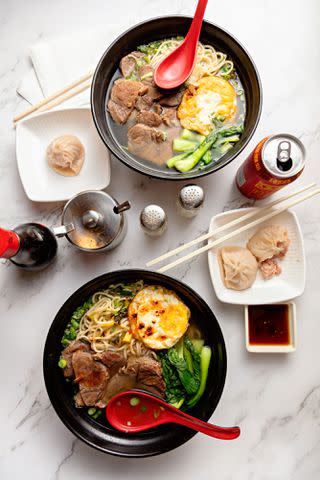
LanZhou has been open only since 2017, yet the quality of their food has placed them in the top tier of Atlanta restaurants. If you've never been here, you might not realize why anyone would go to the trouble of pressing, stretching, and slinging strings of dough to perfection. Even if they didn't taste better, it would be worth watching chef and co-owner Fu Li Zhang create his extraordinary noodles through the kitchen window that's framed by color-morphing LED string lights. You don't need both dinner and a movie when the cooking is this entertaining.
Sean Yang, a kitchen manager at LanZhou, has worked here for three years and is fully confident in what he and the rest of the staff do. "We don't have a lot of dishes like broccoli chicken or the other normal Chinese-restaurant stuff," Yang says. "We're doing the things we know we can do better." And he has lots of praise for Zhang's noodle brilliance. "He's been doing this for 20 years. The ones he makes are a lot more tender than the regular kind. We call them 'cute.' When you eat overcooked noodles, you don't get that same feeling," he says. Yang says it takes 300 pounds of beef and a case full of bones to make the ramen broth, and they use two different types of flour for the noodles. He believes the clarity of the broth is critical. "That's the most important thing. If you see a creamy soup, they didn't do it right. When it's tea colored, that's the best," he notes.
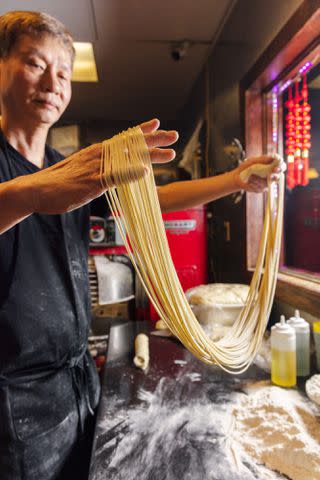
There are also subtle signs that service is taken seriously. Lay down your laminated menu, and one of the waiters will immediately appear. If you haven't chosen your meal, they'll suggest items like the fried chive pancake—a triangular pastry cracker with just the right mix of chew and crisp. Imagine heaven in a savory, cheeseless quesadilla.
Yang's confidence extends outward. Looking at the Buford Highway landscape, where new places to eat never stop opening, he admits he likes the pressure that competition brings. "I think it's great. They're going to attract more customers. Good restaurants are surviving. It's really very simple. If we're not trying our best, we're going down. I love it—the more, the better," he says.
lanzhouramenatlanta.com; 5231 Buford Highway NE., Atlanta, GA
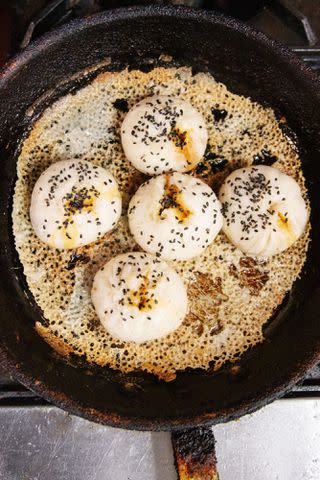
Lee's Bakery
The soul of any great sandwich is fresh-baked bread, and the baguette at Lee's Bakery is something you have to taste to understand. Even the rolls (which you can purchase à la carte) on display inside the transparent case near the restaurant's counter don't seem like they're anything special until you enjoy one of them, especially on menu item #10: the grilled barbecue pork banh mi.
One bite and you'll understand what the hype is all about. It's an incredibly light and airy bread that somehow remains crunchy from the first to the final chomp. It makes a beautiful marriage with marinated pork, carrots, cucumbers, cilantro, jalapeño, and egg mayo. It's what has made this 16-year-old restaurant locally and nationally renowned and brought many curious culinary adventurers to Buford Highway, all seeking to try this sandwich for themselves.
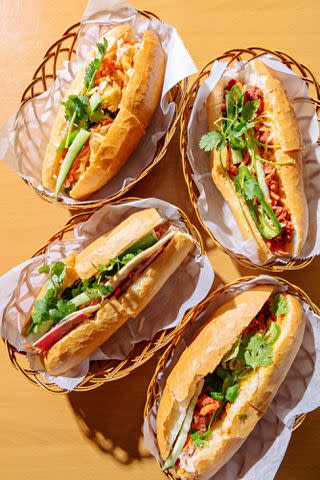
"The banh mi is very popular. Tons of people like it, so they come here a lot," says Lucy Lê, who (along with her husband, John) owns the heralded Buford Highway sandwich shop and Vietnamese eatery. (Lee is the Americanized spelling of the surname Lê.)
You'll find specialty dishes—some that could be considered easier for newbies to approach, like a soup that has crab meatballs and noodles in a tomato broth. There's also Cháo Gà, a Vietnamese take on rice porridge with chicken organs, and the Lê Combo Sandwich, which is the more traditional version of a banh mi that's made with Vietnamese bologna, pork pâté, and headcheese.
Before the couple bought Lee's Bakery, the menu was targeted specifically to Vietnamese diners and was very traditional. Lucy says she and her husband decided to make the food more approachable for non-Vietnamese customers, and today, the dine-in best seller is Lê Combo 1: a half banh mi with a cup of pho. Lucy says they aren't bothered by their customers' Western-leaning tastes. John has even become famous among repeat customers for performing tableside magic tricks. That touch of personalized service—along with the soups and sandwiches—is the heart of the restaurant's success.
Don't fall for the trick question of whether the banh mi at Lee's Bakery is the best in metro Atlanta (or even one of the top versions in America), as more than a few prominent voices in food media have suggested. What's clear is that a great sandwich can cross language and cultural barriers and become a magical experience of its own.
leesbakeryatl.com; 4005 Buford Highway NE., Suite C, Atlanta, GA
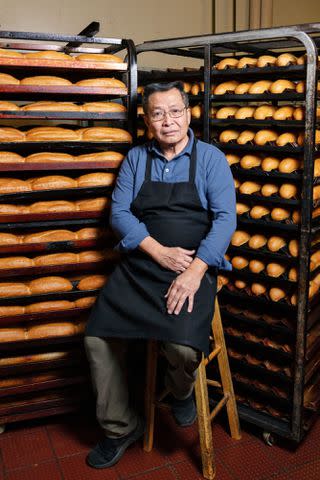
Plaza Fiesta
Bright lights and festive colors jump out from every direction at Plaza Fiesta. Families stroll through the halls, scanning and considering everything from car-stereo subwoofers to princess-inspired dresses. There's something fun and fabulous everywhere you look, and no matter how much you think you've seen, there always seems to be another hidden path to new shops. You'll also find an indoor playground, arcade games, and amazing Latin American food stalls, both in an open food court and tucked along various hallways.
Originally named Buford-Clairmont Mall, the property opened in 1968 and changed ownership several times as the makeup of the area's residents transitioned from primarily White to include more Asian and Latin American families, due to the influx of foreign workers who came to help build venues for the 1996 Olympic Games.
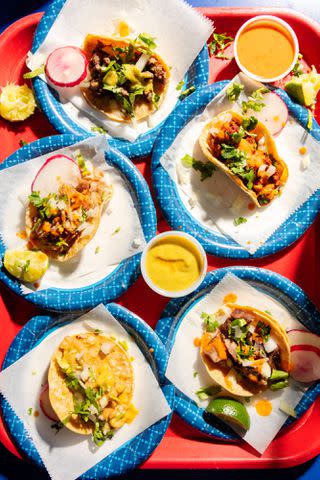
Jorge Gomez is the marketing director for Kennedy Wilson, the real estate investment company that operates Plaza Fiesta. He's been involved since it opened in 2000, after existing as Oriental Mall (which was inspired by a Hong Kong marketplace), and remembers when calls for workers went out from Atlanta to California, West Texas, and even Mexico. "Basically, they came to lend a hand where needed," Gomez says.
Those who moved for jobs liked the city so much that they stayed and invited family and friends—Mexicans, Guatemalans, Salvadorans, and Hondurans—to join them. Plaza Fiesta's 280-plus shops draw nearly 50,000 visitors weekly, Gomez says. Around 85% of the store owners are of Mexican descent, some immigrants and some second-generation Americans, which is why he says it's a place where residents of Latin American origin come to gather, reconnect, and build community—and one of the more prominent means of doing that is through eating.
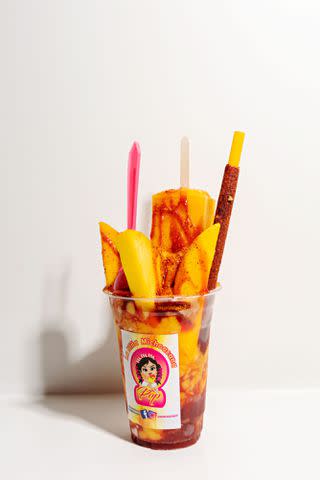
Gomez says the restaurants inside are like "indoor food trucks," where folks order their meals and sit together, cafeteria style, for feast and fellowship. "This is not Tex-Mex," he insists. "The flavors are like back home." And while he says he loves eating at all of Plaza Fiesta's food stalls, he does have a few standbys, like the flavorful nuts at Soy Garapiñados and Venezuelan cuisine at Arepa Grill. He gets his birria at La Generala and highly recommends the affordable street tacos at Las Recetas y Antojitos de la Abuela. "On Wednesdays you'll find a long line of people of all races, including both work crews and office teams, because the street tacos are 50¢ each." Gomez is also a big fan of La Norteña Restaurant, where there's a grilled chicken dish that's finished with red sauce. "That is my favorite," he admits. "I eat that a lot with a salad that has avocado and tomatoes. There's so much good food that I have to watch my diet."
Gomez says that Plaza Fiesta can be summed up best with a Spanish term, domingueando, which roughly translates to "dressing up in one's Sunday best." You'll notice that atmosphere right away. "It is a fun place. I have friends from Colombia and other countries in South America who have never been here, and I tell them they don't know what they're missing. When anyone calls and asks if we have certain stores, I just say yes. If you come here, you won't regret it," he says with a laugh.
plazafiesta.net; 4166 Buford Highway NE, Atlanta, GA

10 More Buford Highway Stops
Add these restaurants to your bucket list:
Bismillah Cafe (INDIAN), 4022 Buford Highway NE.; bismillahcafega.com
Continent Restaurant & Cigar Lounge (AFRICAN AND CARIBBEAN INFLUENCES), 4300 Buford Highway NE., #201-202; thecontinentatlanta.com
Dish Korean Cuisine (KOREAN), 5000 Buford Highway NE., Suite B-203; dishkoreancuisine.com
El Rey del Taco (MEXICAN), 5288 Buford Highway NE.; elreydeltacoatl.com
Gu's Kitchen (SZECHUAN), 4897 Buford Highway NE., Suite 104; guskitchen.com
La Pastorcita (MEXICAN), 3304 Buford Highway NE.; 678/705-8162
Masterpiece (CHINESE), 3940 Buford Highway NE., Suite B-103; masterpieceduluth.com
Nur Kitchen (MEDITERRANEAN), 7130 Buford Highway NE., Suite C-100; nurkitchenusa.com
Roc South Cuisine (SOUTHERN), 3009 Buford Highway NE.; rocsouth.com
Hayakawa (JAPANESE), 5979 Buford Highway NE., Suite A-10; hayakawaatl.com
For more Southern Living news, make sure to sign up for our newsletter!
Read the original article on Southern Living.

